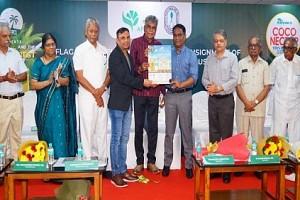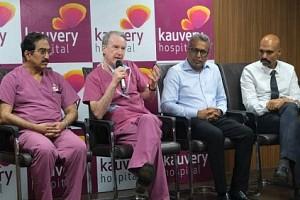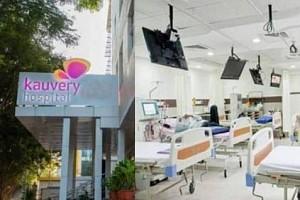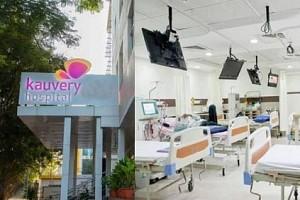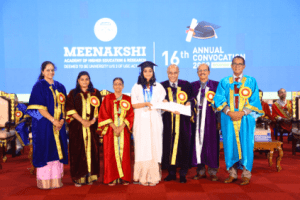Kauvery Hospital performs successful bilateral Lung Transplantation in a patient with complex Scleroderma-related ILD
Home > News Shots > Tamil Nadu newsScleroderma is a common autoimmune disease that causes inflammation and fibrosis in various organs of the body such as skin, esophagus, lungs, kidneys, and finger tips (Raynaud’s phenomenon).

All Images are Subjected to © Copyrights to their respective Owners.
Interstitial Lung Disease (ILD) which causes inflammation and subsequent scarring of the walls of the air sacs leading to permanent reduction in lung capacity and function, is a common feature in Scleroderma, affecting 45-50% of patients with this condition and is a major cause of death.
Pulmonary hypertension (high pressure inside blood vessels in the lungs) can be associated with ILD or exist independently. It worsens breathlessness and can lead to failure of the right side of the heart. Scleroderma related heart scarring can also directly affect heart function.
Early detection of Scleroderma-ILD and timely institution of correct therapy can significantly slow down, or even halt fibrosis in majority of patients. Carefully selected patients with advanced chronic respiratory failure despite appropriate treatment benefit from lung transplantation.
Chennai, 11 April 2023: Kauvery Hospitals Chennai, one of the leading multispecialty hospitals in India, has performed successful bilateral lung transplantation in a woman aged 53, with Interstitial Lung Disease (ILD) related to Scleroderma. Scleroderma is a common auto-immune disease, causing inflammation and scarring of various parts of the body. It affects skin with skin tightening; finger tips (Raynaud’s phenomenon) with ulcers of hands and feet; the esophagus with poor food movement and reflux symptoms; lungs with scarring of the air sacs and pulmonary hypertension, and with kidneys causing renal failure.
The individual was diagnosed with ILD five years ago, and she was being managed with appropriate medications. Unfortunately she continued to worsen with breathlessness on performing daily activities and her worsening lung functions detected by pulmonary function testing (PFTs) and CT scans. She was not on oxygen at this stage but had low oxygen levels on minimal exertion. She underwent a thorough evaluation for lung transplantation that revealed a set of complex challenges. Her disease was optimized with input from our Rheumatologist, Dr Sham and gastroenterologist Dr Arvind. She was added to the transplant list and was awaiting a suitable donor for nine months. During this period, she continued to worsen, needing 8 liters of oxygen at rest during the day and home ventilator support at night.
Dr Srinivas Rajagopala, Senior Consultant in Pulmonology, and Director of Transplant Pulmonology & Lung Failure Unit said, “The transplant was medically complex and required optimization and careful planning. Several centers abroad do not accept scleroderma patients because of the concern of aspiration due to poor movement of the esophagus which can cause permanent damage to the lung graft. Additional concerns in her were that she had severe pulmonary hypertension, and was immunologically sensitized, meaning that she had antibodies (anti-HLA) against potential donor lungs. If the potential donor lungs were to react with these antibodies, it could lead to rejection. Esophageal function was evaluated with 24-hour impedance manometry, pH studies and gastric emptying tests. Motility was improved through medical management and care was taken to ensure no reflux into the proximal part of her esophagus, to limit the risk of aspiration into the lungs. We obtained virtual and actual cross-match at the time of donor availability to avoid antibody-donor lung reactions. Initially, this led to several donor lungs being unacceptable and she continued to worsen without transplant. Subsequently, we changed our strategy and accepted low-level single antigen reactions that we managed with immunosuppression.”
Bilateral lung transplant with central ECMO support was done by Dr Kumud Kumar Dhital,, Program Director with able support of our lead anesthetist and intensivist Dr Pradeep Kumar. She was weaned off the ventilator support within 24 hours and oxygen support by 4th day post-transplant. She was able to walk normally and use the stairs without difficulty by day 10. She was discharged home on the 12th post-operative day, and has now completed her first follow-up. Her lung function continues to improve and she is doing well with resumption of independent daily activities at home.
"Organ transplant procedures require an expert team of surgeons, anesthetists, nurses, perfusionists, intensivists, transplant-specific physicians, and other multi-disciplinary colleagues right from pre-operative to post-operative care. Right from diagnosis, deciding on the need and timing of the transplant, preparing the individual for the surgical procedure, during the procedure up to discharge from the hospital and long-term surveillance, represent a complex journey where every step needs meticulous care and expertise. Led by Prof. Kumud Kumar Dhital, the Heart & Lung Transplant Unit at Kauvery has internationally-recognized surgeons who perform challenging cardiac bypasses, valve repairs, aortic repairs, Heart & Lung transplants, implantation of mechanical circulatory support, and pulmonary endarterectomies, thus saving lives in the most challenging and impossible scenarios. Our transplant nurses, rehabilitation team, nutritionists and allied support staff also play a vital role in the success of any transplant. This entire team along with state-of-the-art infrastructure, provide comprehensive and life-long care to our transplant patients. I congratulate Dr. Srinivas and his team, not only for relieving this patient of her symptoms of advanced lung disease, but also for giving her a new lease of life with a markedly better quality of life. Lung transplants save lives,” says Dr Aravindan Selvaraj, Co-Founder and Executive Director Kauvery Hospital Chennai.
OTHER NEWS SHOTS

